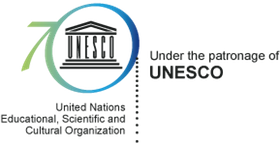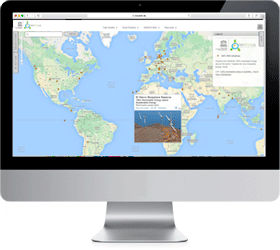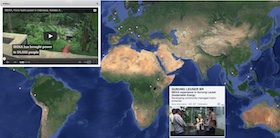100% RENEWABLE ENERGY & CLIMATE CHANGE
The Future Is Now
Global Forum – Madrid, 19th November 2015
PROGRAMME
OPENING SESSION
LEADING THE TRANSITION TO A RENEWABLE ENERGY FUTURES
- Transitioning to a renewable energy future
- Global trends in renewable energy
- The human right to access clean energy and the eradicate energy poverty: a key to reducing inequality
- The commitment to a low-carbon economy: What can politicians, regulators, industry, and citizens do to achieve the necessary transition?
UNESCO
Osman Benchikh. Chief of Section, Innovation and Capacity Building in Science and Engineering, UNESCO
ACCIONA
Joaquín Mollinedo. Chief Institutional Relations Officer, ACCIONA
EXPANSION
Ana. I. Pereda. Director. Expansion.
Panel 1
SUSTAINABLE ENERGY AND GLOBAL COMMITMENTS TO ADDRESS CLIMATE CHANGE
This year, the international community will have a historic occasion to reach a global agreement on climate change and to adopt a new post-2015 inclusive development agenda with a set of sustainable development goals.
The United Nations Climate Change Conference (COP21) provides a unique opportunity to confirm the key role of renewable sources to mitigate climate change.
EU countries have agreed on a new 2030 Framework for Climate and Energy, including EU-wide targets and policy objectives for the period 2020-30: a 40% cut in greenhouse gas emissions compared to 1990 levels; at least a 27% share of renewable energy consumption; and an indicative energy efficiency target of at least 27%. These objectives aim to help the EU achieve a more competitive, secure and sustainable energy system and to meet its long-term 2050 greenhouse gas reductions target.
This framework brings us the opportunity to discuss the main priorities and incentives for citizens and businesses migrating to sustainable energy and low-carbon society.
RENEWABLE ENERGIES: A CRUCIAL SOLUTION TO CLIMATE CHANGE
- Encouraging global leadership on Climate Change
- Renewable Energy and Climate Change policy responses
- The EU 2030 climate and energy framework
- Renewables vis-à-vis inclusive and sustainable development
- Lines of action and incentives to encourage citizens and businesses migration towards clean energy and low carbon industrial processes.
- Sustainable energy for All and the UN 2030 Agenda for Sustainable Development
Introduction:
Pedro Ballesteros Torres. Principal administrator, Directorate General for Energy (DG-TREN). European Commission.
Peter Dogse. Co-Chair of UNESCO’s Task Force on COP21 and Climate Change
Panel Chair:
Eduardo Fayos Sola. President, Ulysses Foundation
Panelists:
Rafael Mateo. CEO, ACCIONA Energy
Manlio Coviello. Chief, Natural Resources and Energy Unit, ECLAC, United Nations
Ibon Galarraga. BC3 Basque Centre for Climate Change
Gunnar Boye Olesen. International Network for Sustainable Energy, INFORSE
Maite Martín Crespo, Head of the Environment and Climate Change, Agencia Española de Cooperación Internacional para el Desarrollo, AECID
Panel 2
100% RENEWABLE ENERGY COMMUNITIES
In the quest towards sustainable energy, some territories and communities have already shown that a renewable future is possible. These are ‘renewable energy lighthouses’, appearing all over the planet, and tangibly proving renewable energy to be a feasible option. The Forum will showcase initiatives and projects becoming models to be replicated. Models from which learnings may be extracted towards the development of viable solutions at different scales. Models ranging from islands and isolated communities to boroughs, villages and even regions.
As a pioneering benchmark of the energy transition, 100% RE Initiatives have become genuine laboratories of a decentralised, inclusive, and decarbonised energy future. In this context, UNESCO designated sites around the world can play a key role by acting as global points of reference where communities run on sustainable energy.
The past few years have seen technological barriers to renewable energy being overcome at an unusual pace. We are witnessing a constant evolution in innovation, from the smallest pico systems to competitive and sophisticated smart grids; from large-scale centralised installations to distributed generation micro-applications. All of them show excellent results across the gamut of renewable energy technologies and fields of implementation. In addition, the problem of variable supply from RE sources is being overcome by turning to increasingly efficient and reliable storage systems.
LIGHTING THE WAY TOWARD A SUSTAINABLE ENERGY FUTURE
- Success stories of communities and territories 100% RE: how to replicate the experiences?
- Universal access to clean and efficient RE services
- UNESCO Designated Sites as models of excellence for RE communities
- New storage solutions for variable RE sources
- Self-consumption, distributed generation, and smart grid futures.
Introduction:
Arthouros Zervos. National Technical University of Athens, President of REN21
Anna Leidreiter. Senior Programme Manager Climate Energy, World Future Council
Panel Chair:
Josep Puig i Boix. President, Board of Trustees, EUROSOLAR (European Association for Renewable Energy)
Panelists:
Bertil Klintbom. Director International Strategies, Region Gotland
Michael Kristensen. Projektleder, Samsoe Energy Academy
Manuel Cendagorta Galarza. Director, Technological Institute of Renewable Energy (ITER)
Chiara Ronchini. International Scientific Committee on Energy and Sustainability – ICOMOS
Miguel Latorre Zubiri. Director of Center for Renewable Energy Development (CEDER-CIEMAT)
Panel 2
SUPPORTING ENERGY TRANSITION
The transition to a new world scenario based on renewable energies and an efficient use of energy requires a common effort agreed by all stakeholders, consumers, producers and facilitators: industry, civil society, local authorities, communities, governments, research, developers and financial institutions.
Networks, associations, and initiatives aiming to 100% RE transition play a crucial role in bringing together the will of different agents, igniting possibilities and creating a dynamic space for cooperation where possibilities can become realities.
BUILDING ALLIANCES TOWARDS 100 PERCENT RENEWABLE REALITIES
- 100% RE partnerships
- Networking, collaboration, knowledge mobilisation and multi-stakeholder dialogue
- The role of RE industry associations
- The right to be producers and users of RE
- International cooperation for RE knowledge transfer
Introduction:
Wolfgang Palz. World Council for Renewable Energy (WCRE)
Cipriano Marín. RENFORUS (Renewable Energy Futures for UNESCO Sites)
Panel Chair:
Christine Lins. Executive Secretary of REN 21 (Renewable Energy Policy Network for the 21st Century)
Panelists:
Ernesto Macias. President, Alliance for Rural Electrification (ARE)
Domingo Jiménez Beltrán. Renewable Energy Foundation (FER)
Angelina Galiteva. Founding Board Chair, Renewables 100 Policy Institute
Emanuele Taibi. International Renewable Energy Agency (IRENA)
“Towards 100% RE: Renewable Energy to Transform the World” – Manifesto
CLOSING SESSION
Isabel García Tejerina, Spanish Minister for Agriculture, Food and Environmental Affairs
Contacts:
Please use the following e-mail address for communicating with the organization of the Forum:
EXPANSION – Prisca Boedo, Program Director, email: pboedo@unidadeditorial.es
RENFORUS – Cipriano Marin, email: c.marin@unescocan.org



















